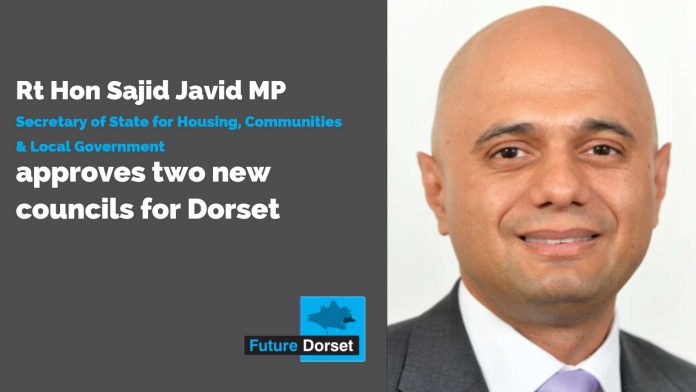Further to my post on 28th February, Secretary of State Sajid Javid has confirmed that the first elections to Rural Dorset unitary council will be on 2nd May 2019. All 82 members (not 76 as previously reported) will be elected then, and thereafter there will be ‘all out’ elections every five years.
Not much detail is to be found on the Dorsetforyou website or in the media; there is more on the (not widely publicised), Dorset Area Joint Committee website, https://dorsetareacouncils.wordpress.com/. In particular there are two useful publications:
- Boundary Review:Dorset Area – Council Size Submission (submitted on 31 January 2018) and
- Task and Finish Groups:“A number of task and finish group shave been established and are detailed in the attached Task and Finish Groups schedule. The document includes the remit of each group together with the membership and lead officer. “
A contact email address, [email protected] is provided but messages to it are being rejected as spam; I have not been able to find out why.
A boundary review is under way, though there is a default position defined in Appendix 3 of the Council Size Submission. In this there will be 82 Councillors elected in 41 2 seater wards. These will be based on existing county divisions. Single seater divisions will become 2 member wards. Each two seater county division will be split into two wards each electing two members. I doubt whether there is time to do better in time for May next year. Will the review continue in preparation for 2024? I don’t know. Elections will almost certainly be conducted using First Past the Post as prescribed by existing law.
The motivation to move to unitary councils is saving money. According to “Your Dorset”, the Revenue Support Grant from government for Dorset this year (2018-2019) is zero. Next year it is expected to be MINUS £10m; i.e. government will charge Rural Dorset £10m for the privilege of running its own affairs – a very regressive tax. Achieving the savings without further loss of services will be quite a challenge. Leader of Dorset County Council Rebecca Knox, is optimistic about this, saying,
“On behalf of the Dorset Joint Committee I am delighted that we have been given this opportunity to create a new council for the heart of the county across Dorset. It is a once-in-a-lifetime opportunity to remodel local services with our communities and partners to be responsive, innovative and above all else, efficient and effective.”
This can only work if people pull together. Differences of opinion must to aired to avoid group think, but they must be argued on their merits. There is no room for yah boo politics; but First Past the Post prevents inter party co-operation. A change of voting system is needed. Under First Past the Post we can expect Conservatives to win a substantial majority with no more than half the vote. Labour will be under represented. Single party government often does lead to group think. And it is not just a question of ‘fair shares for parties. Dorset is made up of differing communities, very rural areas with poor access to transport, and therefore shops and services; smaller towns with better access to shops and some services; and Weymouth where there is deprivation of a different kind. Voters need an effective vote for candidates who understand their particular needs. Only Single Transferable Vote (as now used in Scotland) delivers this.
If First Past the Post is retained, can Rebecca Knox and Sajid Javid achieve their objectives?
The simplest way of getting STV for Dorset would be for Javid to lay an order before parliament for use of STV for Dorset as a one off experiment. Assuming it was successful, primary legislation would be needed to ‘lock it in’, as has been done for Scotland.
An alternative would be to enact Conservative peer Lord Balfe’s Bill, (the Local Government Elections (Referendum) Bill), now awaiting a date for the committee stage in the House of Lords. This would be far too slow; the reform could not take effect before 2029 at the earliest.
David Smith







